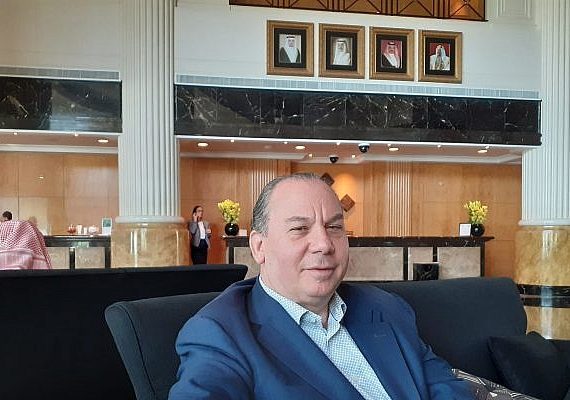
The Times of Israel
By Raphael Ahren
June 25, 2019
Marc Schneier, a member of the kingdom’s delegation to the US-led workshop, says Manama and Jerusalem may normalize relations by the end of 2019, but only if there’s a peace deal

Rabbi Marc Schneier in Manama, Bahrain, June 24, 2019 (Raphael Ahren/Times of Israel)
MANAMA, Bahrain — The kingdom of Bahrain remains fully committed to efforts to improve the Palestinian economy, an American rabbi with close ties to the Gulf country’s ruler said Tuesday, hours before a US-led conference on the administration’s forthcoming peace proposal was set to open here.
The rabbi, Marc Schneier of New York, also said that a future normalization of diplomatic relations between Bahrain and Israel is “possible” by the end of the year, though not in the absence of a peace agreement with the Palestinians.
“I think the conference will generate tremendous momentum that will propel things forward. It’s a very, very powerful consortium,” he said of participants of the Peace to Prosperity workshop, which is billed as the rollout of the first — purely economic — part of the US administration’s two-pronged proposal for an Israeli-Palestinian peace deal.
US President Donald Trump’s senior adviser Jared Kushner, who is spearheading the peace initiative, said that the second part of the proposal, which deals with the political issues of the conflict, will likely be released toward the end of the year, after the Israeli elections.
“I think the focus on economics is the right way to go,” Schneier told The Times of Israel, sitting in the lobby of Manama’s Ritz Carlton Hotel while wearing his black knitted kippah.
“This conference is more of a Gulf initiative than a Trump initiative,” he said. “I’ve heard, for several years now, from different Gulf leaders, the importance of addressing the economic plight of the Palestinians, that that should be the first step of the process. I think the Trump administration has responded to what the Gulf leaders have been saying for several years. I think we’re on the right course here.”
Schneier, the founder and head of the Foundation for Ethnic Understanding, has for many years conducted extensive ties with the rulers of many Muslim countries, including nearly all Gulf states.
Late last year, he was named a “special adviser” to the king of Bahrain, Hamad bin Isa Al Khalifa. In this unpaid position, the rabbi was tasked with assisting the King Hamad Global Centre for Peaceful Coexistence based in Manama, and helping in preserving and growing the country’s small Jewish community.
The rabbi, who established and runs a Jewish community in the Hamptons, is participating in this week’s Peace to Prosperity workshop as an official member of the Bahraini delegation.
The Palestinian Authority is boycotting the two-day conference, which will open Tuesday night with a brief speech by Kushner, arguing that one cannot discuss the Palestinian economy as long as the Palestinian people’s aspirations for statehood are not addressed. In light of Ramallah’s boycott, the White House decided not to invite Israeli government officials to the event, though a handful of Israeli businesspeople are here.
But according to Schneier, the Palestinian leadership’s resolute opposition to the event is “temporary.”
Schneier has long argued that the common enmity toward Iran, and a changing economic environment, is bringing Israel and the Gulf states closer to each other, predicting that Bahrain would be the first to formally establish relations with the Jewish state sometime in 2019.
“I believe that can happen,” he reiterated on Tuesday. “But I also know how committed the king of Bahrain is to the economic plight of the Palestinian people. For anyone to suggest that the Gulf is not committed is to the Palestinians is a very big mistake. It’s a balanced, fair approach.”
At the same time, full normalization of ties remains impossible in the absence of a peace deal, he added. “They are committed to a Palestinian state… There needs to be a peace deal. There needs to be some kind of resolution between the Israelis and the Palestinians.”
Schneier, who is married to an Israeli, said he’s optimistic about a deal that would grant the Palestinians some sort of statehood by the end of the year. “The direction, or the directive of this conference, and the trajectory of what’s happening, is spot-on,” he said.
“You can’t discuss statehood and territories if people are in a state where their economy is imploding. And that’s the whole logic here right now.”
Copyright © 2025 Foundation For Ethnic Understanding. All rights reserved. | Privacy Policy